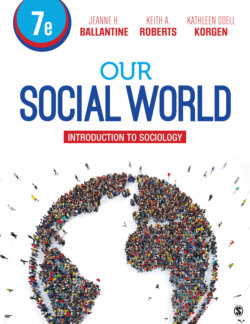Читать книгу Our Social World - Kathleen Odell Korgen - Страница 111
На сайте Литреса книга снята с продажи.
Society: The Hardware
ОглавлениеThe structures that make up society include the micro-level positions we hold (parent, student, and employee); the groups to which we belong (family, work group, and clubs); and the larger groups, organizations, or institutions in which we participate (educational, political, and economic organizations). This “hardware” (structure) of our social world provides the framework for “software” (culture) to function.
Societies, usually countries but sometimes distinct sovereign groups within countries (such as Native Americans), differ because they exist in different locations with unique resources—mountains, coastal areas, jungles, and deserts. Although human societies have become more complex over time, especially in recent history, people have been hunters and gatherers for 99% of human existence. Only a few groups remain hunters and gatherers today. As Table 3.1 illustrates, if all human history were to be compressed into the lifetime of an 80-year-old person, humans would have started cultivating crops and herding animals for their food supply only a few months ago. Note the incredible rate of change that has occurred just in the past 2 centuries.
Thinking Sociologically
What major changes took place in your grandparents’ lifetimes that affect the way you and your family live today?
▼ Table 3.1
Societies are organized in particular patterns shaped by factors that include the way people procure food, the availability of resources, contact with other societies, and cultural beliefs. For example, people can change from herding to farming only if they have the knowledge, skills, and desire to do so and only in environments that will support agriculture. As societies develop, changes take place in the social structures and relationships between people. For example, in industrialized societies, relationships between people typically become more formal because people must interact with strangers and not just their relatives. It is important to note that not all societies go through all stages. Some are jolted into the future by political events or changes in the global system, and some resist pressures to become modernized and continue to live in simpler social systems.
